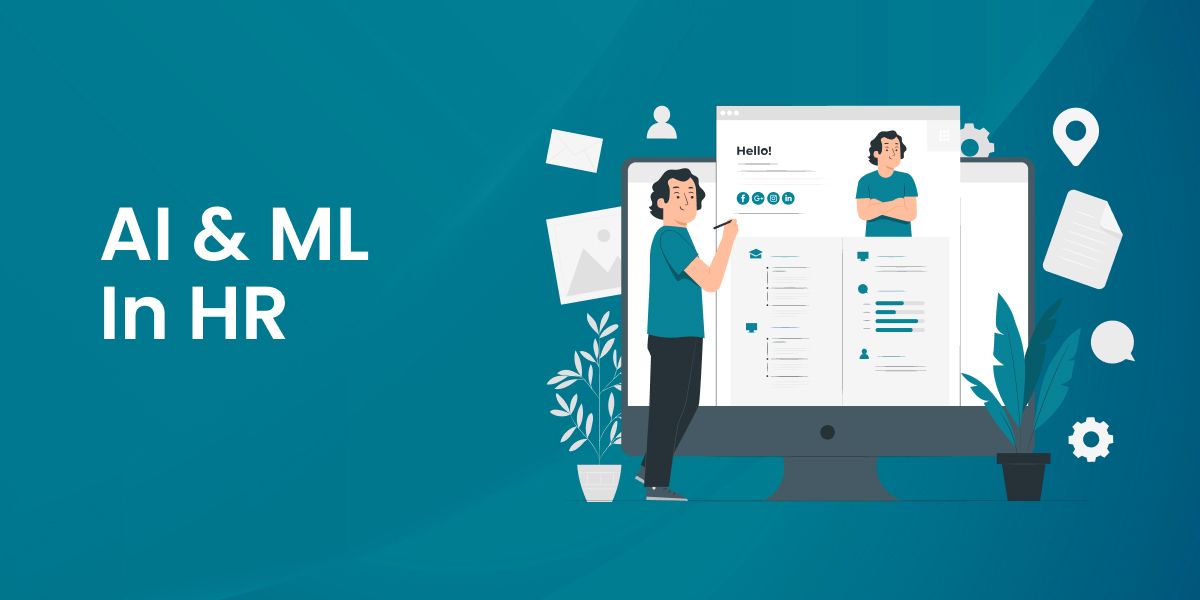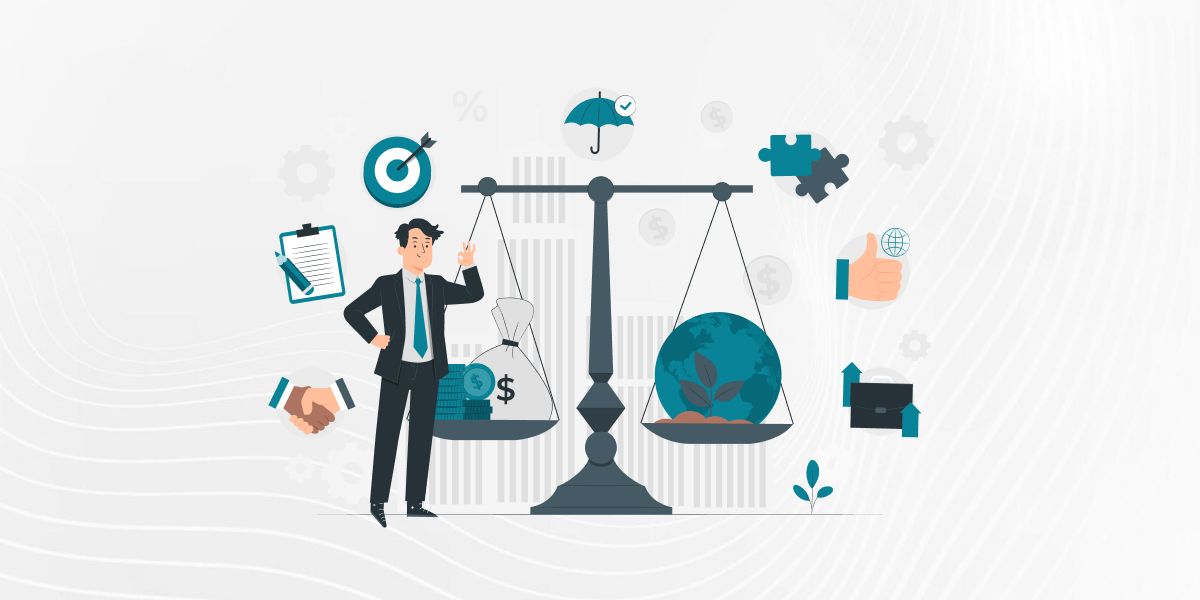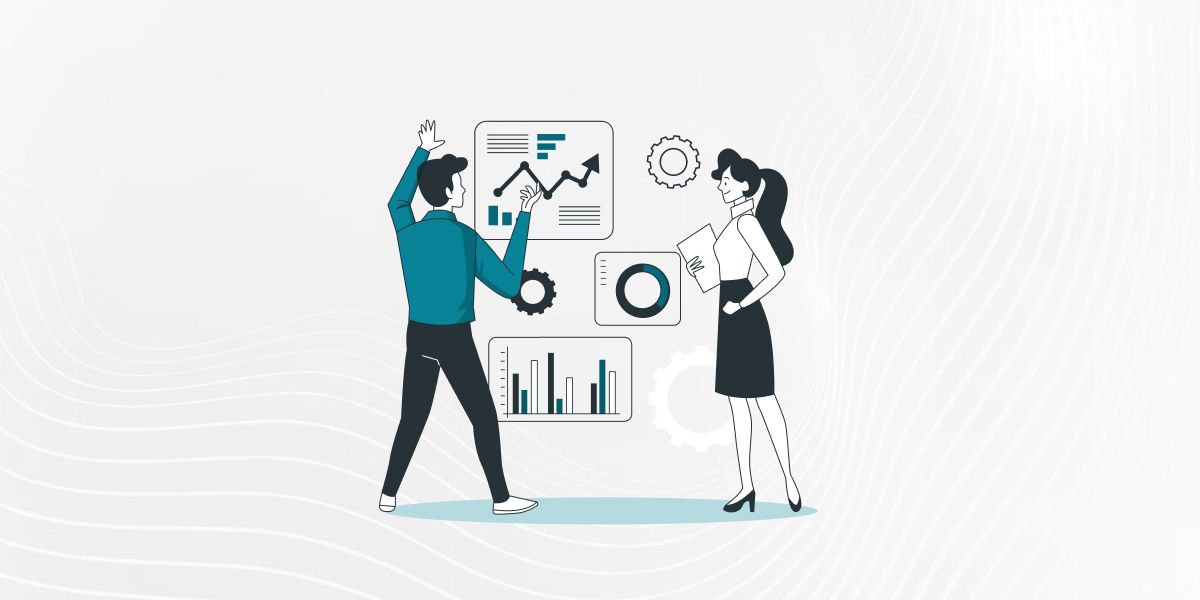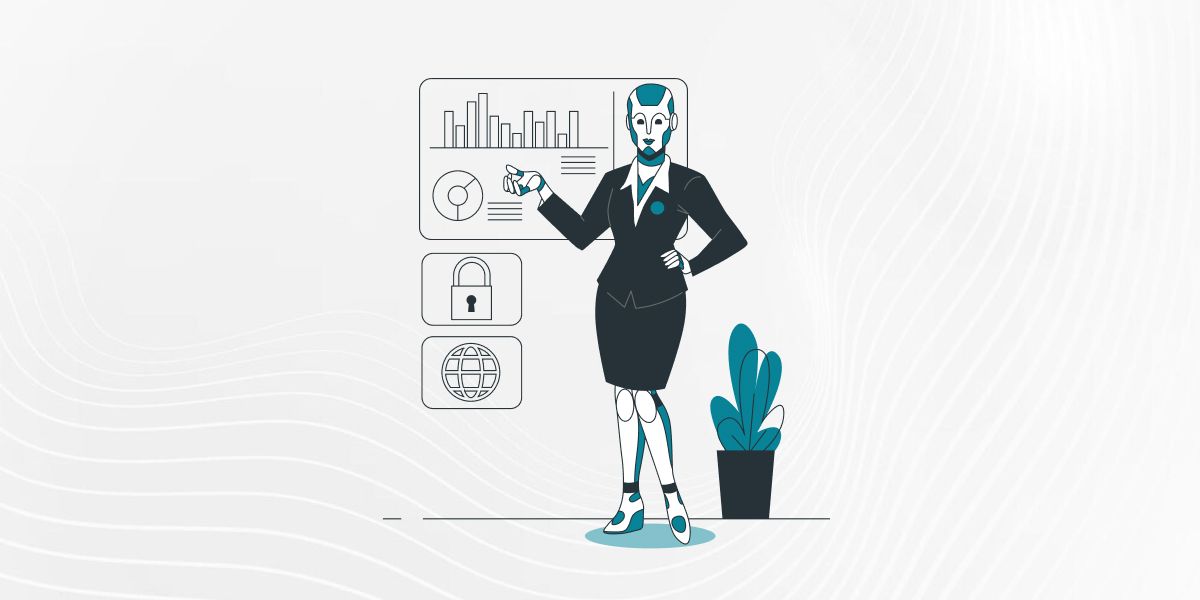Artificial Intelligence (AI) and Machine Learning in HR
Explore the impact of AI and ML in HR. Improve recruitment, performance evaluations, and employee engagement while minimizing bias in hiring processes.

In the modern workplace, Artificial Intelligence (AI) and Machine Learning (ML) have emerged as transformative tools in the field of Human Resources (HR), enabling organizations to optimize processes, enhance productivity, and drive strategic decision-making. By integrating these technologies into HR practices, organizations are achieving unprecedented levels of efficiency in talent acquisition, human capital management, and employee lifecycle management.
AI applications in HR extend across recruitment, onboarding, performance evaluations, workforce planning, and employee engagement, shaping how organizations interact with current and prospective employees. AI is not only making these processes more efficient but also aims to address one of the longest-standing challenges in HR: reducing bias. By leveraging algorithms and data-driven decision-making, HR teams can minimize the impact of human subjectivity, creating a fairer, more inclusive hiring process.
In this guide, we’ll explore the wide-ranging impacts of AI in HR, from recruitment software and HR cloud solutions to workforce analytics and HCM software. Additionally, we’ll discuss the ethical considerations involved in deploying AI in HR, such as transparency, accountability, and privacy, ensuring these technologies are used responsibly.
Overview of AI in HR
AI's role in HR has evolved rapidly, from simple automation of repetitive tasks to sophisticated applications that predict employee success and uncover hidden insights about workforce sentiment. Here, we delve into the main ways AI is transforming HR functions.
- Resume Screening: The recruitment process often begins with resume screening, a task that can be cumbersome and time-consuming. AI-powered recruitment software streamlines this task by automatically filtering resumes according to keywords, job criteria, and previous hiring data. This reduces the time it takes to shortlist candidates, particularly for large organizations that receive hundreds or thousands of applications.
AI-enabled talent acquisition systems can also identify subtle patterns, such as a candidate's ability to grow within a role based on past career trajectory. This capability allows HR to go beyond qualifications and consider factors like adaptability and long-term potential.
- Employee Sentiment Analysis: Keeping employees engaged and satisfied is a critical component of human capital management. AI tools that analyze employee sentiments gather data from surveys, feedback forms, and even internal communication platforms to assess overall morale and engagement.
For example, sentiment analysis tools can scan feedback for positive or negative language, helping HR teams address potential issues before they escalate. Workforce analytics derived from these tools offer insights into trends, such as dips in morale or emerging frustrations, that could otherwise go unnoticed. This enables a proactive approach to employee satisfaction and retention, benefiting the organization as a whole.
- Predictive Hiring: Predictive hiring goes beyond screening to forecast a candidate’s potential success within the organization. By analyzing historical data, AI can predict which candidates are likely to excel based on factors like previous job performance, skills, and behavioral traits.
For instance, if data shows that employees with certain personality traits excel in client-facing roles, predictive hiring algorithms can prioritize candidates who exhibit similar traits. This approach can reduce turnover by aligning hires with job requirements and workplace culture from the start. Predictive hiring also supports better workforce planning, allowing HR to anticipate skill gaps and proactively recruit talent.
AI-Powered Recruitment and Employee Management

AI’s contributions to recruitment and employee management are manifold. In addition to automating administrative tasks, AI-powered systems promote diversity, reduce bias, and enhance the overall employee experience.
- Benefits of AI in Recruitment Software:
- Time Savings: The recruitment process is often lengthy, with HR teams juggling multiple roles, coordinating interviews, and screening applicants. AI-powered recruitment software can automate initial steps such as resume screening, pre-employment assessments, and even scheduling interviews. This reduces administrative workload and allows HR professionals to allocate time toward strategic decisions and candidate engagement. Organizations that implement AI-based recruitment systems report up to a 60% reduction in time-to-hire, making a strong case for AI-driven efficiency.
- Bias Reduction: While human bias is a well-known obstacle in hiring, AI offers solutions that make the recruitment process more objective. Algorithms trained to prioritize skills and experience over subjective factors help reduce bias related to gender, ethnicity, and socioeconomic background.
For example, some systems anonymize resumes, removing names and other identifying information to ensure candidate evaluations are based purely on qualifications. Additionally, AI systems trained with diverse datasets can better identify and correct patterns that may inadvertently disadvantage certain demographics, supporting more inclusive hiring practices.
- Personalized Employee Support: Once a candidate is hired, AI extends its benefits to employee management by offering personalized support through HCM software and HR cloud solutions. Systems like Oracle Cloud HCM track employee progress, recommend tailored training modules and identify growth opportunities based on individual performance metrics. This approach not only benefits the employee but also aligns with the organization's talent development goals, making human capital management a more strategic endeavor.
AI-driven HR cloud solutions can also improve employee experience by offering quick access to support resources, answering FAQs, and helping with routine tasks such as PTO requests, ensuring employees feel valued and supported.
- Enhanced Candidate Experience: In a competitive job market, candidate experience is essential. AI enables HR teams to provide timely updates, automate communication, and streamline processes, all of which contribute to a positive candidate experience. AI chatbots, for example, can answer candidates’ questions in real-time, giving them a sense of transparency and immediacy that strengthens the company’s employer brand.
Ethics and Challenges of AI in HR
While AI in HR promises numerous benefits, it also brings forth ethical dilemmas and challenges that need to be addressed to ensure responsible use. Here’s a closer look at some key considerations.
- Addressing Potential Bias: AI is often touted as a solution to human bias, but if not managed carefully, it can introduce or amplify existing biases. For example, if historical hiring data favored certain demographics over others, AI algorithms trained on this data may replicate these patterns. This has led to widely publicized cases where AI systems showed gender or racial biases in hiring.
To mitigate this risk, HR teams must use diverse, representative datasets and regularly audit algorithms to ensure fairness. Additionally, incorporating input from diverse stakeholders when developing and deploying AI systems can help identify potential biases that may not be immediately apparent.
- Transparency and Accountability: A major ethical consideration in AI-driven HR is transparency. Many AI algorithms function as “black boxes,” where decisions are made without clear explanations. For example, if an AI system rejects a candidate or rates one employee lower than another, HR professionals and candidates should be able to understand why.
Transparent AI systems that offer explanations can improve trust among employees and candidates, fostering a culture of accountability. Organizations can also consider creating roles specifically focused on AI ethics and transparency, ensuring that AI-driven decisions are fair and understandable.
- Balancing Efficiency with Privacy: Privacy is another critical issue when using AI in HR, especially as employee data is increasingly collected and analyzed. While AI tools that analyze employee performance or engagement can provide valuable insights, they can also infringe on privacy if not handled appropriately. For instance, continuous tracking of employee activity may lead to concerns about surveillance and autonomy.
HR teams must establish clear policies around data usage and ensure employees are informed about how their data is collected and used. Adhering to data protection laws, such as the GDPR, is crucial for organizations operating in regions with strict privacy regulations.
- Navigating Legal and Compliance Risks: As AI technologies evolve, so too do the legal implications. For instance, some jurisdictions have introduced regulations that require companies to provide explanations for automated decisions. HR teams must stay informed about relevant laws to ensure compliance, particularly when deploying AI in recruitment or employee monitoring.
Case Studies of AI in HR
To illustrate the real-world impact of AI in HR, here are a few examples of companies successfully implementing AI in their HR practices:
- Unilever’s AI-Driven Recruitment Process: Unilever, a global consumer goods company, adopted AI in its recruitment process to reduce bias and streamline hiring. Candidates are assessed using AI-powered video interviews, where algorithms analyze responses, body language, and even tone of voice to determine suitability. This approach has allowed Unilever to significantly reduce the time spent on hiring while also creating a more inclusive hiring process.
- IBM’s Watson for Talent Management: IBM uses its AI system, Watson, to manage employee engagement and career development. Watson analyzes data to provide personalized career guidance to employees, matching them with development opportunities that align with their career aspirations. This enhances employee satisfaction and retention while enabling HR to manage talent more effectively.
- H&M’s Use of Predictive Analytics for Workforce Planning: H&M, a major clothing retailer, uses AI-driven predictive analytics to manage staffing needs across its stores. By analyzing historical sales data, the system predicts staffing requirements, allowing H&M to allocate resources more efficiently and avoid overstaffing or understaffing, both of which impact customer satisfaction and operational efficiency.
Leveraging AI for Candidate Sourcing: Introducing HireQuotient’s EasySource

In addition to streamlining recruitment processes and enhancing employee management, AI-powered tools are transforming candidate sourcing — helping organizations quickly find, attract, and engage top talent. One such advanced solution is HireQuotient’s EasySource, an AI-driven candidate sourcing tool designed to revolutionize the way HR teams discover potential hires. EasySource integrates artificial intelligence to search, filter, and connect with candidates, making it an essential tool for talent acquisition teams looking to optimize their sourcing efforts.
How AI Enhances Candidate Sourcing
Traditional candidate sourcing can be time-consuming and resource-intensive, often involving lengthy searches across job boards, social networks, and resume databases. EasySource leverages AI to simplify this process by automating candidate searches, reducing the time it takes to identify suitable candidates. Here are a few ways EasySource enhances candidate sourcing through AI:
- Smart Candidate Matching: EasySource’s algorithms analyze job descriptions, keywords, and other parameters to match them with candidate profiles that best align with the role. By employing data-driven matching techniques, EasySource ensures that HR professionals are presented with a curated list of high-potential candidates, saving time and improving hiring accuracy. This smart candidate matching also ensures that only the most qualified candidates make it to the shortlist, aligning with organizational goals and culture.
- Advanced Filters and Customization: EasySource allows HR teams to apply advanced filters, such as experience level, industry, location, and skill set, to narrow down search results. This customization feature enables recruiters to tailor their sourcing to specific needs, enhancing precision in talent acquisition. With EasySource, hiring managers can even search for passive candidates who may not be actively looking for new roles but are open to opportunities, broadening the talent pool.
- Automated Outreach: Candidate engagement is as important as candidate sourcing. EasySource offers AI-powered automated outreach tools that streamline communication with potential hires. Recruiters can set up personalized outreach campaigns to engage candidates through email or messaging platforms, ensuring timely follow-ups and maintaining candidate interest. By automating outreach, EasySource helps companies improve their employer brand, as candidates receive consistent and professional communication throughout the recruitment process.
- Predictive Insights for Candidate Fit: Beyond finding candidates, EasySource uses predictive insights to assess the likelihood of a candidate’s success within the organization. These insights are derived from analyzing past hiring data, skill requirements, and cultural fit, enabling recruiters to make more informed decisions. Predictive analytics also contribute to better workforce planning by helping HR anticipate future talent needs based on historical trends and organizational growth.
- Streamlined Candidate Shortlisting: Once potential candidates are identified, EasySource provides a streamlined process for shortlisting, allowing recruiters to rank candidates based on various criteria, such as skills, experience, and predicted performance. This feature helps HR teams manage high volumes of candidates effectively, ensuring a smooth transition from sourcing to hiring. By providing clear insights into each candidate’s strengths, EasySource assists HR teams in making well-informed decisions.
The Impact of AI-Powered Sourcing on Talent Acquisition

AI-driven candidate sourcing tools like EasySource have transformed the recruitment landscape by providing HR professionals with the tools they need to find and engage the right talent faster and more effectively. Here are a few ways EasySource positively impacts talent acquisition:
- Reduced Time-to-Fill: With AI handling the initial stages of candidate search and outreach, EasySource significantly reduces the time it takes to fill open positions. By automating sourcing tasks, recruiters can focus on interviewing and evaluating candidates, improving overall recruitment efficiency.
- Increased Diversity and Inclusion: EasySource’s AI algorithms are designed to minimize bias, promoting diversity in candidate sourcing by focusing on skill sets and qualifications rather than extraneous factors. This unbiased approach aligns with many organizations’ diversity and inclusion goals, helping them build more diverse teams.
- Enhanced Candidate Experience: The automation of outreach and personalized messaging through EasySource ensures that candidates remain engaged and informed throughout the recruitment process. This focus on candidate experience helps organizations build a positive employer brand, which can be a deciding factor for candidates evaluating multiple job offers.
- Data-Driven Decision Making: EasySource’s predictive insights and candidate analytics enable HR teams to make data-backed decisions, minimizing the guesswork in hiring. By leveraging historical data and current job requirements, EasySource empowers recruiters to make strategic decisions that contribute to long-term talent retention and organizational growth.
EasySource and the Future of Candidate Sourcing
As organizations continue to navigate competitive talent markets, tools like EasySource represent the future of candidate sourcing. By integrating AI into sourcing practices, HR teams can reach qualified candidates more quickly and effectively, gaining an edge in the hiring process. Moreover, EasySource’s ability to facilitate candidate engagement and predict job fit not only saves time and resources but also drives better hiring outcomes.
In a world where talent acquisition is becoming increasingly complex, EasySource and similar AI-driven tools offer HR teams the capabilities they need to stay ahead. With AI automating and enhancing every aspect of candidate sourcing, organizations can look forward to a more efficient, inclusive, and data-driven approach to recruitment.
AI for Employee Development and Retention

Beyond recruitment and sourcing, AI has a significant role in employee development and retention, providing HR teams with tools to foster continuous growth and keep valuable employees engaged. By leveraging workforce analytics, personalized training, and predictive retention insights, AI empowers organizations to proactively support their workforce, aligning individual career goals with the organization’s long-term objectives.
AI-Powered Learning and Development (L&D)
AI transforms Learning and Development (L&D) by creating personalized training programs tailored to individual skills, job roles, and career aspirations. Instead of offering generic training modules, AI-driven systems assess each employee’s skill gaps, learning preferences, and career goals to recommend specific courses and resources.
- Personalized Training Programs: With AI-powered L&D platforms, employees receive customized learning paths that address their unique development needs. For instance, AI can identify which employees might benefit from advanced training in leadership skills, technical competencies, or project management. This targeted approach ensures that employees receive relevant development opportunities, enhancing both engagement and productivity.
- Skill Gap Analysis: AI tools can analyze organizational data to identify skill gaps within teams or departments, helping HR teams create strategic development plans. By comparing existing employee skills with future needs, AI enables proactive training initiatives that prepare employees for evolving job roles, fostering a culture of continuous learning.
- Microlearning and Adaptive Learning: AI can break down learning content into microlearning modules, allowing employees to learn in short, manageable segments. Adaptive learning, powered by AI, adjusts the complexity and pace of content based on an employee’s progress, ensuring an efficient and engaging learning experience.
Predictive Retention and Proactive Engagement
Employee turnover is costly and disruptive, making retention a critical focus for HR teams. AI-driven predictive analytics allow organizations to forecast turnover risks, proactively addressing issues before they lead to attrition.
- Turnover Prediction: AI models analyze factors like employee engagement scores, performance data, and feedback to identify patterns often preceding turnover. This predictive retention analysis highlights employees at risk of leaving, enabling HR teams to intervene with tailored retention strategies, such as career development conversations, promotions, or adjustments to workload.
- Sentiment Analysis and Employee Feedback: AI-powered sentiment analysis tools evaluate employee feedback and engagement surveys to gauge overall morale. By continuously monitoring employee sentiment, HR can identify areas that need attention, such as workload management, recognition programs, or work-life balance initiatives. This real-time feedback loop supports a more responsive and employee-centered culture.
- Enhanced Career Pathing: AI also enables career pathing, helping employees visualize and plan their career progression within the organization. By identifying potential career trajectories and recommending the necessary training, AI helps employees see a future in the organization, strengthening retention.
Employee Wellness and Mental Health Support

Employee well-being is essential for retention, and AI-driven wellness programs offer resources to support mental and physical health.
- Wellness Recommendations: AI tools can offer personalized wellness suggestions based on data such as work hours, productivity levels, and feedback. Recommendations might include health resources, stress management workshops, or tailored PTO suggestions.
- Employee Assistance Programs (EAPs): Many AI solutions can integrate with EAPs to offer immediate mental health resources and connect employees with support services. Chatbots powered by AI provides a confidential, accessible way for employees to reach out for help, ensuring that well-being support is available 24/7.
The Impact of AI-Driven Development and Retention on Organizational Growth
AI-powered employee development and retention strategies benefit not only the individual but also the organization as a whole:
- Increased Employee Engagement: Personalized learning opportunities and career paths foster a sense of purpose, increasing engagement and job satisfaction.
- Enhanced Talent Retention: By proactively identifying and addressing retention risks, organizations can retain high-performing employees, reducing turnover and associated costs.
- Future-Ready Workforce: With continuous skill development supported by AI, organizations can prepare their workforce to meet evolving industry demands, ensuring long-term competitiveness.
Through AI-driven L&D, retention insights, and wellness support, HR teams can build a more agile, engaged, and resilient workforce. By addressing development and retention holistically, AI contributes to a workplace that values growth, well-being, and career fulfillment — key components of a thriving organization.
Conclusion
The integration of AI and machine learning into HR practices is reshaping the way organizations manage and engage with their workforce. By automating repetitive tasks, reducing bias in recruitment, and enabling data-driven insights into workforce management, AI empowers HR teams to make strategic, impactful decisions.
However, as we move toward an AI-driven future in HR, it’s essential to address ethical considerations, ensure transparency, and respect privacy to harness the full potential of these technologies responsibly.
HR professionals who embrace AI while adhering to ethical standards are better positioned to drive organizational success and build inclusive, supportive workplaces. By balancing efficiency with fairness, AI has the potential to revolutionize human capital management, making HR more efficient, equitable, and insightful.
